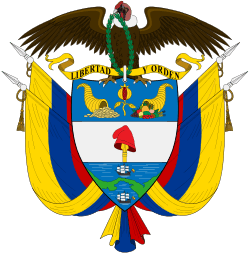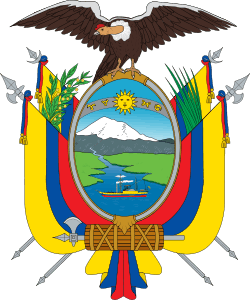Colombia–Ecuador relations
 |
|
Colombia |
Ecuador |
|---|---|


Colombia–Ecuador relations refers to the diplomatic relations between the neighboring Republic of Colombia and Republic of Ecuador. The present territory of both countries was part of the Spanish Empire from the sixteenth to nineteenth centuries. After the wars for independence against the Spain led by Simón Bolívar, Ecuador, Colombia (then called New Granada), and Venezuela became part of the Republic of Gran Colombia in 1819. Gran Colombia struggled to hold itself together as a country, and after intense civil conflicts between political factions, the union fell apart in 1830.
Diplomatic relations
Present-day Colombia and Ecuador trace back established official diplomatic relations to December, 1831 with the signing of the Treaty of Pasto, in which both countries recognized each other as sovereign states. The Ecuadorian diplomatic mission in New Granada (Colombia) did not open until 1837. It wasn't until 1939 that Ecuador raised the diplomatic mission's status to an official Embassy. Colombia did the same the following year in 1940.[1]
Andean diplomatic crisis (2008)
On March 1, 2008 the Colombian military launched an attack against FARC in the border area between Colombia and Ecuador, which ended with the death of some 19 guerrillas including the group's second in command Raul Reyes and one Colombian soldier. The attack targeted a guerrilla camp some 1.8 km inside Ecuadorean territory.
Colombian president Álvaro Uribe called the Ecuadorean president Rafael Correa, arguing that Colombian forces had crossed the border during combat in pursuit of the guerrillas. Correa said he would investigate the events and later accused the Colombian president of being either misinformed or lying to him. The accusation was based on the information provided by the Ecuadorean army in the bombed area, describing what Correa later called a "massacre". According to the Ecuadorean president, bodies in their underwear or pajamas were found in the guerrilla camp, indicating that they would have been sleeping at the time of the bomb raid and that there was no "hot pursuit" as president Uribe had informed him hours earlier. The Ecuadorean president decided then to recall his ambassador in Bogotá for consultations. The Colombian government subsequently apologized for its actions while accusing the Ecuadorean government of giving safe conduct to the FARC. The Organization of American States authorized the Colombia-Ecuador Good Offices Mission to promote the re-establishment of trust among the two governments through confidence building measures and prevent and verify any border incidents.[2]
Reacting to the event, President of Venezuela, Hugo Chávez stated that if Colombia launched a similar operation within Venezuelan borders he would consider it a casus belli and verbally attacked the Colombian president. Chávez ordered ten Venezuelan national guard battalions to the Colombia-Venezuela border and closed its embassy in Bogotá. Chávez also offered his support to Ecuadorean president Correa.
Purported plans to destabilize Colombia
In a press conference held on March 3, 2008 the Colombian National Police chief Oscar Naranjo claimed that their intelligence service had confiscated three computers from Raúl Reyes with extensive information purportedly detailing a close relationship between the FARC and the governments of Hugo Chávez and Rafael Correa. The police chief stated that these documents proved that the Ecuadorian government agreed with Reyes to provide safe conduct for him in Ecuadorian territory. He also accused Venezuela of having plans to destabilize the Colombian government and a plan to provide uranium to the FARC and produce a dirty bomb.
These claims are denied by the Ecuadorian government sustaining that the little contact they had with FARC was well known by the Colombian government, and it was for humanitarian purposes only. In a visit to Brazil, Correa made a comparisson by pointing out that president of France, Sarkozy is also in contact with FARC, and yet nobody would even think to accuse him of such things. Venezuela rejected the accusations by sarcastically saying that from these computers would come out every document the Colombian government decides they need.
Suspension of diplomatic relations
As a response to the crisis the Ecuadorean government of Rafael Correa decided to end any diplomatic relations with Colombia, ordered the Ecuadorean embassy in Colombia to close and expelled the Colombian ambassador.
The Ecuadorian and Colombian presidents Rafael Correa and Álvaro Uribe agreed to restore low-level diplomatic relations at the level of Chargé d'Affaires immediately and without preconditions on June 6, 2008 following individual communications with and under a deal brokered by former U.S. President Jimmy Carter.[3][4]
See also
References
- ↑ (Spanish) mmrree.gov.ec diplomatic relations of Colombia and Ecuador
- ↑ http://www.oas.org/sap/peacefund/ColombiaAndEcuador/
- ↑ "Ecuador and Colombia Presidents Accept President Carter's Proposal to Renew Diplomatic Relations at the Level of Chargé d'Affaires, Immediately and Without Preconditions" (Press release). The Carter Center. 2008-06-06. Retrieved 2008-06-07.
- ↑ "Colombia, Ecuador restore ties under deal with Carter". Reuters (Thomson Reuters). 2008-06-06. Retrieved 2008-06-07.
External links
| |||||||||||||||||||||||||
| |||||||||||||
| ||||||||||||

